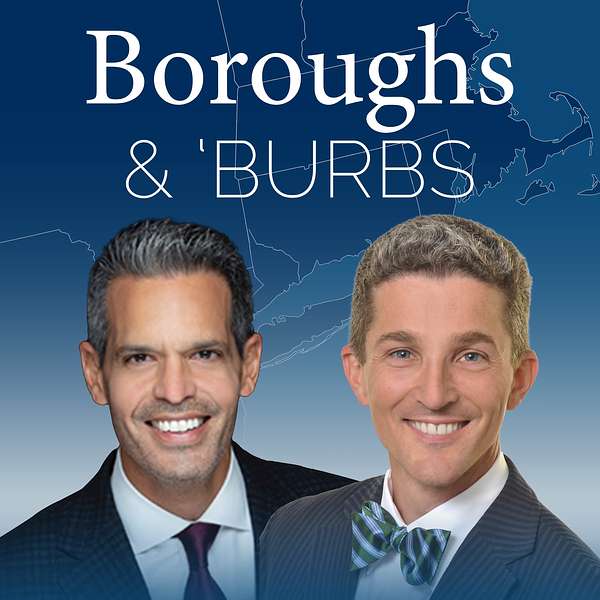
Boroughs & Burbs, the National Real Estate Conversation
Real estate: the ultimate game of risk and reward.
It's the biggest investment most people ever make
Fortunes are won and lost every day.
How do you stay ahead of the game?
Who's buying, who's selling and why?
You need an edge.
Boroughs & Burbs
This podcast is your secret weapon, giving you the insider knowledge and strategies you need to succeed in the high-stakes and cutthroat world of real estate.
The Boroughs are New York City.
The Burbs are wherever you are: Connecticut, Austin, the Hamptons, Carolinas, Florida and beyond.
From Palm Beach to Palm Springs, Manhattan to Malibu
we travel the country pressing the experts in every luxury market to expose the pain, find the deals, and occasionally predict the future.
Don't settle for mediocrity - tune in to Boroughs & Burbs Thursdays 3pm Eastern and start dominating your market.
Boroughs & Burbs, the National Real Estate Conversation
Boroughs & Burbs 46: "Tax The Rich, They Won't Move" A Conversation on Migration and Demographics
"Tax the Rich, They Won't Move"
Wait, is that even true?
Join us for a conversation with University of Connecticut Professor Thomas Cooke on demographic trends, American migration and why people are more content than ever to just stay put.
Use the Meeting ID: http://zoom.us/j/92135931351
Or, binge watch all 46 shows on Youtube.
Subscribe now: http://bit.ly/399yevL
“We’re having this long-term and short-term transition to remote work, and people don’t have to move as often,” Thomas Cooke says. “So if you lose your job, and you have a partner and a family and you’re connected to your neighborhood, you can stay where you are and adjust to not have to cut ties with all those things that are important to you.”
- Thomas Cooke in "What's Next for the Connecticut Real Estate Market?"
Thomas Cooke, PhD is Professor Emeritus of Geography at the University of Connected and a Demographic Consultant focusing on population projections, migration policy, and demographic analysis.
Subscribe now: http://bit.ly/399yevL
The 2020 National Movers Study says New Jersey, New York, Illinois, Connecticut, and California saw the highest proportion of outbound migration.
7 Questions For the Professor:
1. The Importance of Demographics. When a big demographic group (boomers) reach a certain age (18 year old men) their buying habits change. This is the reason that motorcycle sales peaked in the early 70’s. Companies like Honda time these trends correctly and make a fortune. Can you give us a case study or two on the importance of paying attention to demographic trends and where we are in the cycle now?
2. Millenials. I understand that they represent about 35% of the nation and that since they are turning 30 they are suddenly interested in settling down, buying their first house. Let’s talk about the Millenials. How old are they, how many of them are there, and what do they buy?
3. Boomers. I understand that they represent about 35% of the country and they have all the money. I am under the impression that while TV advertisers are not targeting them as a group Realtors definitely are. Are they buying second homes or are they the ones downsizing, selling the beach house to a GenX’er and staying put. Are they moving to southern states and tax-free jurisdictions to preserve wealth? Describe where the Boomers are in their journey and why?
4. Moving/Staying Put. You said that people are not moving as often, “this long-term and short-term transition to remote work and people don’t have to move as often”. Talk to us about whether this is a long-term or short-term phenomenon.
5. Urban/Suburban. They used to say “when New York City sneezes then Connecticut catches cold”. The Connecticut economy has traditionally been dependent on the health of the New York economy. Covid seemed to change that, where the suburbs were the beneficiaries of urban disruption, particularly New York’s.
6. Schools. You do a lot of work on population projections for towns and schools. In Connecticut the schools have been shrinking. Why? (And where are these kids going?) My town, New Canaan, Connecticut, is known to have good schools and our real estate values are dependent on investing properly in education. We depend a great deal during budget season on getting the number right and predicting accurately the size of each class. Why is it so hard to predict and will towns like Darien and New Canaan continue to defy the experts and grow forever?
7. Tax the Rich. Massachusetts recently proposed to tax the rich. Advocates for the tax say that only a fraction of the rich will move out of state as a result. Is there any evidence that this is true and that the tax is a net winner? What is the effect on Connecticut if both Massach

